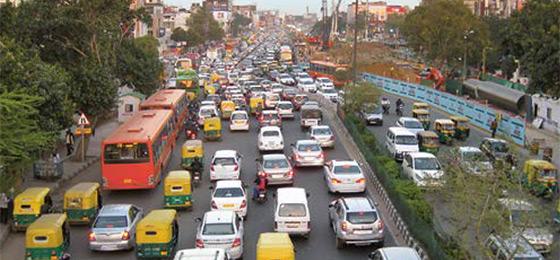In the world's biggest democracy

Hans-Christian Baumann spent twelve months working on his doctoral thesis in Delhi. He was investigating the elections there and was surprised by more than just his findings.
(From "Horizons" no. 107, December 2015)
"I hadn’t expected conducting research in Delhi to be so physically strenuous. I went there in 2014 both to investigate the election campaigns of the biggest Indian parties, and to see how the two most important Indian daily papers reported on the election. I was interested in the ‘hot’ phase of the campaign. But the weather at the time was even hotter still. April to June is the hottest period in Delhi, and it was never less than 40 degrees Celsius. The Centre for Culture, Media and Governance of Jamia Millia Islamia University is situated in a pretty poor district. There were regular power cuts on account of the heat – and that meant the air-con and the computers also stopped working. That really got on my nerves. I sometimes felt like the archetypal Swiss philistine who gets annoyed at small things. I didn’t just suffer from the heat, but from the air pollution too. I rode to work in the back of a three-wheel tuk-tuk taxi, and often had to wear a face mask. The journey took 40 minutes on average, but there were days when it took up to three hours. If I hadn’t been living in an air-conditioned apartment, I really don’t know if I’d have been able to stick it out.
Fighting bureaucracy
"The field work in Delhi was only successful because I’d already built up a good local network on an earlier visit. If you haven’t got serious contacts, then there’s a real danger you’ll be thwarted by the notorious Indian bureaucracy. I also had my fair share of it. In order to register as a resident, I had to report to various offices across the whole town, queueing for hours in the sun. At some point, an official came past my apartment on his motor cycle and brought me my residence permit.
"In democracies, the media play a decisive role in an election, especially the key media. They influence the way the other media report things. In the West, these agenda-setting effects have been well investigated, but not in India, which is the biggest democracy in the world. I wanted to know how the two biggest Indian parties, Baumannplus the Hindi-language newspaper Hindustan and the English-language Times of India reported on the two leading candidates: Rahul Gandhi from the Congress Party and Narendra Modi from the opposing Bharatiya Janata Party.
“The fact that I was able to come back with good data was thanks most of all to two Indian Master students whom I employed as coders. I can read Hindi pretty well, but I’m a long way from being able to speak the language fluently. And it wouldn’t have sufficed for me to be able to analyse the content of the newspapers and of the election campaigns of the two parties. These two students worked up to eight hours every day for ten weeks in the burning heat, and never let themselves be unsettled by our technical problems. The deal was good for both sides: they were able to earn money and got insights into the scholarly working practices of the West, and I in turn received linguistic and cultural support from them.
An independent press
"I’m astonished at the results I got. Traditionally, Hindustan was the instrument of the Congress Party, while the Times of India was the newspaper of the former British colonial masters. During the election, however, these roots were no longer visible at all. Both newspapers reported very independently and very critically about both candidates, influencing each other in the process. What is noteworthy is that the two parties did not succeed in steering the direction of the media coverage. This actually wouldn’t have been so unusual in India, because politicians and private sponsors often try to influence the media there. On the World Press Freedom Index run by Reporters Without Borders, India is very far down the list in 136th place. However, my results are of an exploratory nature and are restricted to the most significant national newspapers and the two biggest national parties. We would need to conduct a lot more research in India in order to be able to understand these effects on regional and local levels too".
Recorded by Pascale Hofmeier